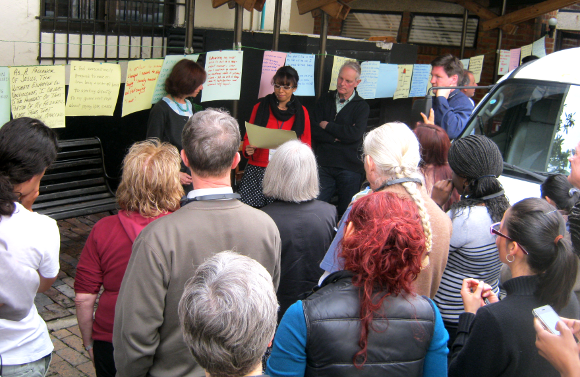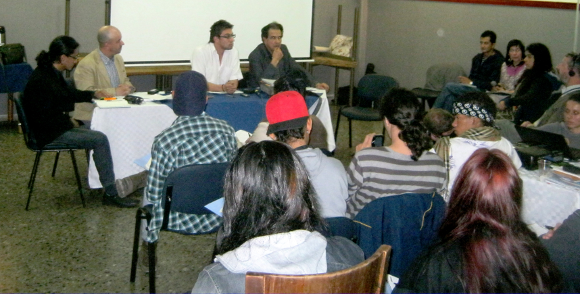Miscellaneous Conference Notes
Next Meeting
The 15th international conference will likely be held in Geneva. Rather than looking for a local group in Geneva to act as a host and sponsor, a committee of conferees will work together to plan the conference themselves.
Social Media
A number of the regional groups and campaigns reported that they were making attempts to experiment with social media outreach, but they largely felt out of their depth in this area. Some groups noted that because of the demographics of their membership, social media (or even email) was ineffective for in-group outreach. In one case, a group reported that three-quarters of its members do not use email at all, so for them a printed and snail-mailed newsletter is essential for keeping them informed and involved.
Bringing COMT/WTR to a New Audience
The Colombian antimilitarist movement is so urgently concerned with stopping batidas and protecting the rights of conscientious objectors to military service that the issue of war tax resistance has not been a priority. This conference did a good job of putting that issue on the radar here among the people most likely to adopt it.
Statements of Conscience
Conferees, led by Dan Jenkins and Jens Braun, spent several hours over two days trying to better articulate the conscientious motives that lead them to conscientious objection and/or tax resistance. It can be difficult to come up with a good “elevator pitch” to explain to people we meet why we resist (and why maybe they should too), and this is crucial to the growth and thriving of our movement. If we can better articulate how we became war tax resisters, we can more clearly point out the path for other people to follow.

a conference participant reads from her distilled statement of conscience
What is conscience? What does it tell us? What helps us to listen to conscience and follow its advice? Can you sum up in one or two sentences your motivation for your resistance?
Speakers
We were treated to several speakers on a variety of topics related to conscience, the situation in Colombia, and the prospects for demilitarization.
Alan Vargas and Nicolás Navas gave us a status report on the state of conscientious objection in Colombia. They are particularly concerned about the way the law puts a burden of proof on the objector to show that his objection is long-held and demonstrable in his past actions. This prevents the law from recognizing an “objector via epiphany” and is particularly inappropriate since draftees are very young men, who rarely have any history of grappling with issues of conscience and nonviolence and who are likely to be in the process of forming their characters rather than having any fixed characters to demonstrate.

Alan Vargas and Nicolás Navas talk about legal strategies for expanding the rights of conscientious objection to military service in Colombia, and Ciro Roldán gives us the philosophical and historical background in which the concept of conscientious objection has evolved.
Philosophy professor Ciro Roldán recapitulated the philosophical history of conscientious objection, from Antigone to the protestant reformation to relatively new concept of “freedom of conscience” and through to the modern Hegelians. He argued (as has Juan Carlos Rois in Spain) that rather than arguing that some people ought to have the freedom of conscience to object to military service, we really should be arguing that everybody has a right not to kill or be put in the line of fire against his will. It’s not so much that conscientious people ought to be exempt from the draft, but that the government ought not to be in the drafting business at all. Pursuing a right of conscientious objection puts the objectors on the defensive; instead, we should put the state on the defensive.
Javier Garate of War Resisters International and the Global Day of Action against Military Spending addressed the conference via Skype about the pillars of militarism and how to attack them (using Gene Sharp’s nonviolent action framework).
Clara López told us of her days as a Students for a Democratic Society radical at Radcliffe during the Vietnam war (she’s a politician today: former mayor of Bogotá and now a presidential candidate and head of a left coalition political party) and of her views about how addressing urban violence and resolving the drug war are essential to a genuine peace process.
Alberto Yepes, coordinator of the Human Rights Observatory, gave us the context and consequences of the militarization of Colombian society in recent decades, and how this is linked with inequality in Colombia, with corruption and theft of public resources, and with Colombia being seen as an important franchise of the U.S. military-industrial complex.
Professor Carlos Mario Perea spoke of how urban violence is the undernoted but exceptionally important counterpart of the guerrilla wars in Colombia, and how the two feed on one another and need a common resolution.
Former constitutional court justice and presidential candidate Carlos Gaviria advocated a peace process that would result in the eventual abolition of the Colombian military. He thought that economic inequality and political reform must be part of the peace process, and that since any results of that process would necessarily be political in nature, the process ought to be transparent and open to participation by political representatives, and not just behind-closed-doors negotiations between the warring factions. He was cynical about the current peace talks, but thought they might have symbolic value and could prompt the wider society to begin a crucial revolution of ethical values.
Ricardo Esquivia, who has been fighting for conscientious objection in Colombia for over two decades, spoke about conscience and memory. His text was Romans 12:2 (“And be not conformed to this world: but be ye transformed by the renewing of your mind, that ye may prove what is that good, and acceptable, and perfect, will of God.”) He highlighted how the many small ethical transgressions that have become commonplace have poisoned society and help to provide cover for larger horrors (he related a Colombian proverb about public works projects which is that you should always add in a little extra in your bid so that you have enough money left over after the bribes and kickbacks to do the job). It’s not so much that we need to develop a “new ethics” as that we need to more seriously engage with the ethics we’re all familiar with. Nonviolent activists, he says, because we do not have the discipline, practice, and professionalism of our military counterparts, are often overmatched — we need to take our activism more seriously and put our backs into it in the same way soldiers are expected to. Why was there only one conscientious objector in prison in Colombia? If there were five, ten, fifteen… that might be all it took for outrage and rebellion to begin.
Peter Newton is trying to revive the tradition of utopian world federalism that was so central to the peace movement 150 years or so ago. That movement died out in the wake of the failures of the League of Nations and the horrors of utopian movements with world-spanning ambitions like totalitarian communism, but Newton believes its time has come again. People are not naturally violent, he says, and governments are not necessarily corrupt: We could come together to build large-scale political structures that make the world more peaceful and more free if we put aside our cynicism and got down to it.
